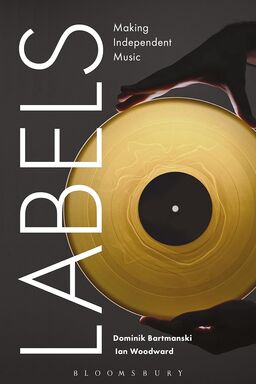
Labels : making independent music
Dominik Bartmański & Ian WoodwardBartmański, Dominik Bok Engelsk utgitt 2020
Ledig
- Sølvberget, 3. etasje Musikk: 1 av 1 ledig
Plassering: Musikkbøker (sortering: 781.49 BAR)

*0010933710 *003NO-OsBA *00520240403122802.0 *007ta *008 s2020 a e ||||||0| 0 eng|d *009 cam a22 c 4500 *019 $bl *020##$a9781474280457$cNkr 468.00$qheftet *035 $a(NO-LaBS)31042332(bibid) *035 $a(NO-OsBA)0723856 *040 $aNO-OsBA$bnob$erda *082 $a338.76178$qNO-OsBA$223/nor/20240403 *090 $c781.49$dBAR *1001#$aBartmański, Dominik$d1978-$0(NO-TrBIB)1707991621530$4aut$_48980400 *240 $aLabels$_48980500 *24510$aLabels$bmaking independent music$cDominik Bartmański & Ian Woodward *264 $aLondon$bBloomsbury Academic$c2020 *300##$axviii, 307 sider$billustrasjoner *336##$atekst$0http://rdaregistry.info/termList/RDAContentType/1020$2rdaco *337##$auformidlet$0http://rdaregistry.info/termList/RDAMediaType/1007$2rdamt *338##$abind$0http://rdaregistry.info/termList/RDACarrierType/1049$2rdact *386##$aAustraliere$bau.$mNasjonalitet/regional gruppe$2bibbi$81 *386##$am$mKjønn$811 *505 $aPrologue : 'You can't put a price on freedom' -- Introduction : understanding independent labels -- Being independent -- Material economy -- Symbolic economy -- Urban ecology -- Epilogue : writing independent culture. *520 #$aThe music industry is dominated today by three companies. Outside of it, thousands of small independent record labels have developed despite the fact that digitalization made record sales barely profitable. How can those outsiders not only survive, but thrive within mass music markets? What makes them meaningful, and to whom? Dominik Bartmanski and Ian Woodward show how labels act as taste-makers and scene-markers that not only curate music, but project cultural values which challenge the mainstream capitalist music industry. Focusing mostly on labels that entered independent electronic music after 2000, the authors reconstruct their aesthetics and ethics. The book draws on multiple interviews with labels such as Ostgut Ton in Berlin, Argot in Chicago, 100% Silk in Los Angeles, Ninja Tune in London, and Goma Gringa in Sao Paulo. Written by the authors of Vinyl, this book is essential reading for anyone with an interest in the contemporary recording industry, independent music, material culture, anthropology, sociology, and cultural studies. Review "This is an important book for all of those interested in the micro-social worlds of independent music production. Through talking at length with many key figures involved in independent music labels in various locations across the globe, Bartmanski and Woodward get to the heart of what it means to be ‘independent’ from the point of view of those who live and breathe this ethos every day in their professional and creative lives. - Andy Bennett, Griffith University, Australia A crucial book in any reflection on the freedom of the creative process. It is vital for those seeking to understand the importance of independence as an existential category in late modernity’s cultural processes. This book's writing is remarkable as it sits simultaneously within research canon and that of music lovers. - Paula Guerra, University of Porto, Portugal In Labels, a worthy successor to Vinyl, Bartmanski and Woodward demonstrate just how far discussions of creativity, markets and cities have come in just 20 years. The bookmoves nimbly between an account of ‘independent’ music labels and their differentiation from the ‘mainstream.’ For me, the most refreshing aspect of Bartmanski’s and Woodward’s argument is the invocation of Sennett’s The Craftsman. Like Sennett, the authors propose making is as important as consuming, perfectionism and functionality can be tempered with respect for constraint and contingency, and cities and their spaces may just be where we (re)discover post-fordist or post-industrial forms of ‘cooperation’. - Professor Eduardo de la Fuente, Honorary Fellow, School of Humanities and Social Inquiry, University of Wollongong, Australia Not only a detailed study of today’s independent music recording scenes, but also a compelling and accessible account of contemporary creativity, freedom and self-expression, Labels will appeal as much to music aficionados as to social scientists. It is as rich, diverse and fascinating as the cultural worlds it evokes. - David Inglis, University of Helsinki, Finland" About the Author Dominik Bartmanski works in the Sociology Department at the Technical University of Berlin, Germany. Ian Woodward is Professor at the University of Southern Denmark, Denmark. *546##$aEngelsk tekst *650 0$aMusikkindustri$_14750600 *650 0$aPlateproduksjon$_14303700 *650 0$aPlateselskaper$_13710400 *650 7$aMusikkbransjen$gbedrifter$0(NO-OsBA)1142025$2bibbi$9nno$_48980600 *650 7$aMusikkbransjen$gbedrifter$0(NO-OsBA)1142025$2bibbi$9nob$_48980700 *7001#$aBartmański, Dominik$d1978-$0(NO-TrBIB)1707991621530$tLabels$_48980400 *7001#$aWoodward, Ian$0(NO-TrBIB)90148008$4aut$811$81$_48980800 *8521#$h338.7$iBAR *856##$aaja.bs.no$qimage/jpeg$uhttps://media.aja.bs.no/ff2d747a-2a9f-4645-b40e-50fbb7d4eb1e/original.jpg$3Omslagsbilde *856##$aaja.bs.no$qimage/jpeg$uhttps://media.aja.bs.no/ff2d747a-2a9f-4645-b40e-50fbb7d4eb1e/thumbnail.jpg$3Miniatyrbilde ^